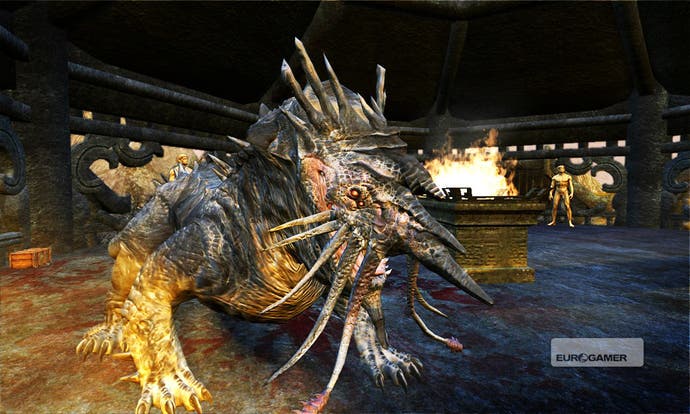Age of Conan: Rise of the Godslayer
Die another deity.
Which, naturally, raises a couple of questions. How will Funcom prevent players from becoming massively overpowered, and from drowning their screens in buttons? The answers lie in "an evolution of" a system pioneered by Guild Wars, of which Morrison declares himself a fan. You'll have a limited deck for skills earned through alternate advancement, meaning you'll have to choose which abilities to use, but you will have freedom to swap what's in these slots out of combat. Some particularly powerful skills might use two slots.
"Yes, if we were going to layer all of those abilities that you saw on top, we'd be screwing ourselves," Morrison laughs. "You can't possibly have a player having another 150 abilities active on top of the ones they have.
"By using those slots, it really allows the player to still be collecting abilities and feel they have options to change their role. In MMOs, players can get very pigeon-holed... It gives them a lot more choice in how they play through the content. They're not going to be better [in another role] than someone who's designed to do it, but if they put the right abilities in that bar, they might be able to hold down, in a pinch, a role that they don't have."
This free-form model for character progression has its reflection in how you'll move through the lands, and quests, of Khitai. Funcom certainly has a flow in mind, the huge, contiguous zones having their climax in the final area Pai Kang, which has been designed as a microcosm of the whole continent with its dense jungle, tropical coast and magnificent city furnishing the endgame content.

"There is a difficulty curve," Morrison confirms. But with all but one of the zones being for maximum-level players, it's an organic and loose progression at best, suggested by the skills you earn - which answer certain skills used by the enemies you face - rather than strictly gated by level band. Without raising the level cap, Funcom has no way of strictly controlling your movement through Khitai. Nor, says Morrison, does it really want to.
"It's kind of a meta-levelling system," he says. "We could have called it numbers, but rather than a scale going straight up, it's more of a curve... it allows us more flexibility and to spread things out more, so [players] can explore the content more openly. There's nothing worse than getting to a new expansion and knowing that for the first two weeks, all I'm going to see is this playfield. And then, if I concentrate and level, I'm going to be high enough so that the first thing I see in the next one doesn't insta-kill me."



.png?width=291&height=164&fit=crop&quality=80&format=jpg&auto=webp)




.jpg?width=291&height=164&fit=crop&quality=80&format=jpg&auto=webp)
